| Article ID | Journal | Published Year | Pages | File Type |
|---|---|---|---|---|
| 5092341 | Journal of Comparative Economics | 2014 | 21 Pages |
â¢Performance of Russian homeowners associations (HOAs) is measured and explained.â¢Tenants' “technical civic competence” is essential for HOA success.â¢Conventional social capital is an imperfect substitute for technical civic competence.â¢Slow-moving cultural change and lack of market development hamper HOA performance.
Homeowners associations (HOAs) implement collective management in residential housing. We assess the performance of such associations in Russia by using the stochastic frontier technique. Cultural traits enabling tenants to make proper use of the HOA decision-making procedures are essential for resolving the collective action problem and ensure accountability of governing bodies and outside contractors. Such “technical civic competence” has a stronger impact on HOA performance than more conventional forms of social capital which rise in their significance when HOA governance breaks down and informal grassroots alternatives are mobilized instead. Massive and indiscriminate “supply-led” introduction of collective management in residential housing without matching cultural and institutional prerequisites could be counterproductive. Flexibility, freedom of choice, and market development are required to avert the failures of HOAs commonly observed in Russia.
